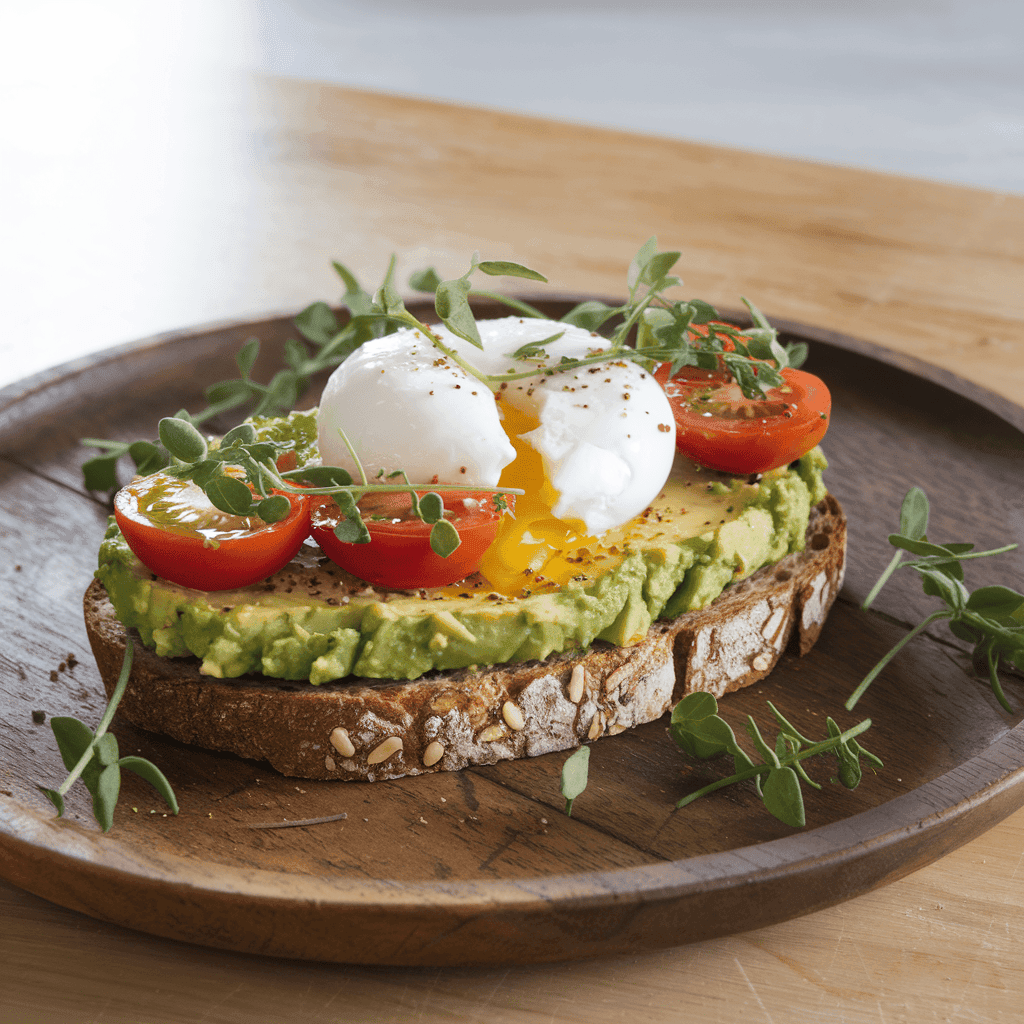Avocado toast has taken the culinary world by storm, becoming a staple on breakfast menus worldwide. Its creamy texture, rich flavor, and Instagram-worthy appeal have made it a favorite among health-conscious eaters. But is avocado toast actually healthy, or is its reputation built on hype?
Table of contents
Nutritional Profile of Avocado Toast
Avocado toast is more than a trendy breakfast—it’s a nutrient-packed meal offering a range of essential vitamins, minerals, and macronutrients. Understanding its nutritional breakdown can help you determine whether it fits into your healthy eating plan.
1. Macronutrients in Avocado Toast
- Healthy Fats:
Avocados are loaded with monounsaturated fats, which support heart health by reducing bad cholesterol (LDL) levels. In fact, a medium avocado contains about 15 grams of fat, primarily from these beneficial fats. Moreover, including avocados in your diet can help balance cholesterol levels while also providing essential nutrients like potassium and fiber. Therefore, adding avocado toast to your meal plan can be a heart-healthy choice when paired with whole-grain bread and nutrient-rich toppings. - Carbohydrates:
The type of bread used affects the carbohydrate content. Whole-grain or sprouted bread provides complex carbs and fiber, supporting long-lasting energy. - Protein:
While avocados are low in protein, adding toppings like eggs, nuts, or seeds can increase the protein content for muscle repair and satiety.
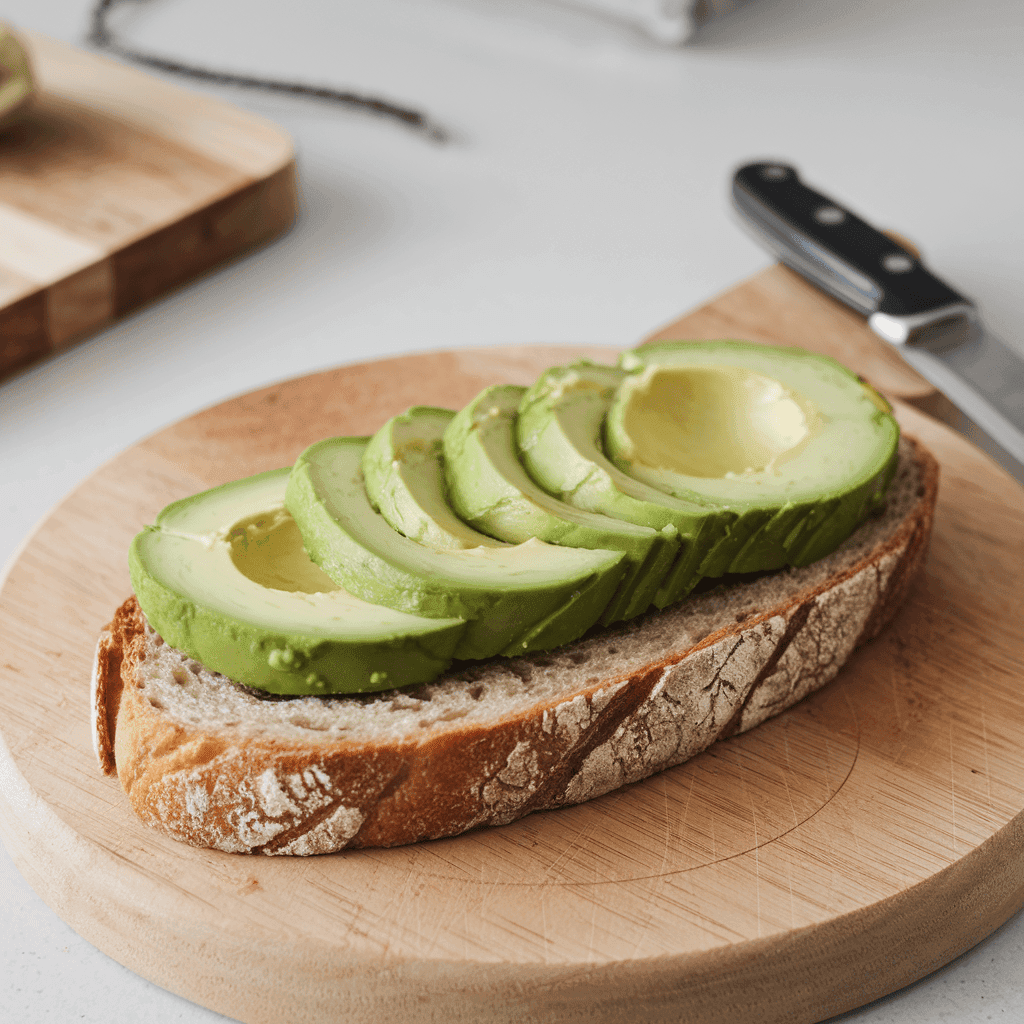
2. Essential Vitamins and Minerals
Avocados are nutrient powerhouses, providing a wide range of essential vitamins and minerals:
- Vitamin K: Supports bone health and blood clotting.
- Vitamin E: Acts as an antioxidant, protecting cells from damage.
- Vitamin C: Boosts the immune system and promotes skin health.
- B Vitamins (B6, Folate): Help with energy production and brain function.
- Potassium: Balances electrolytes and supports heart health, containing more potassium than bananas.
- Magnesium: Supports muscle and nerve function.
3. Dietary Fiber
A single serving of avocado provides about 7 grams of dietary fiber, aiding digestion and promoting gut health. When paired with whole-grain bread, avocado toast becomes a fiber-rich meal that supports satiety and digestive regularity.
4. Caloric Content
The calorie count of avocado toast depends on portion size and added toppings. On average:
- Bread (1 slice): 70-120 calories (depending on type).
- Avocado (1/2 medium): 120-150 calories.
- Toppings: Eggs, nuts, or seeds can add 50-200 calories.
Summary of Nutritional Benefits
Avocado toast delivers a balance of essential nutrients, making it a versatile and healthy meal option when portioned correctly. However, customization plays a significant role—health-focused ingredients can enhance its benefits, while calorie-heavy toppings may negate its nutritious appeal.
Health Benefits of Avocado Toast
Avocado toast isn’t just delicious—it’s also packed with health benefits that can improve overall well-being. Thanks to its nutrient-rich ingredients, avocado toast can support heart health, weight management, digestion, and more. Let’s explore its key health advantages in detail.
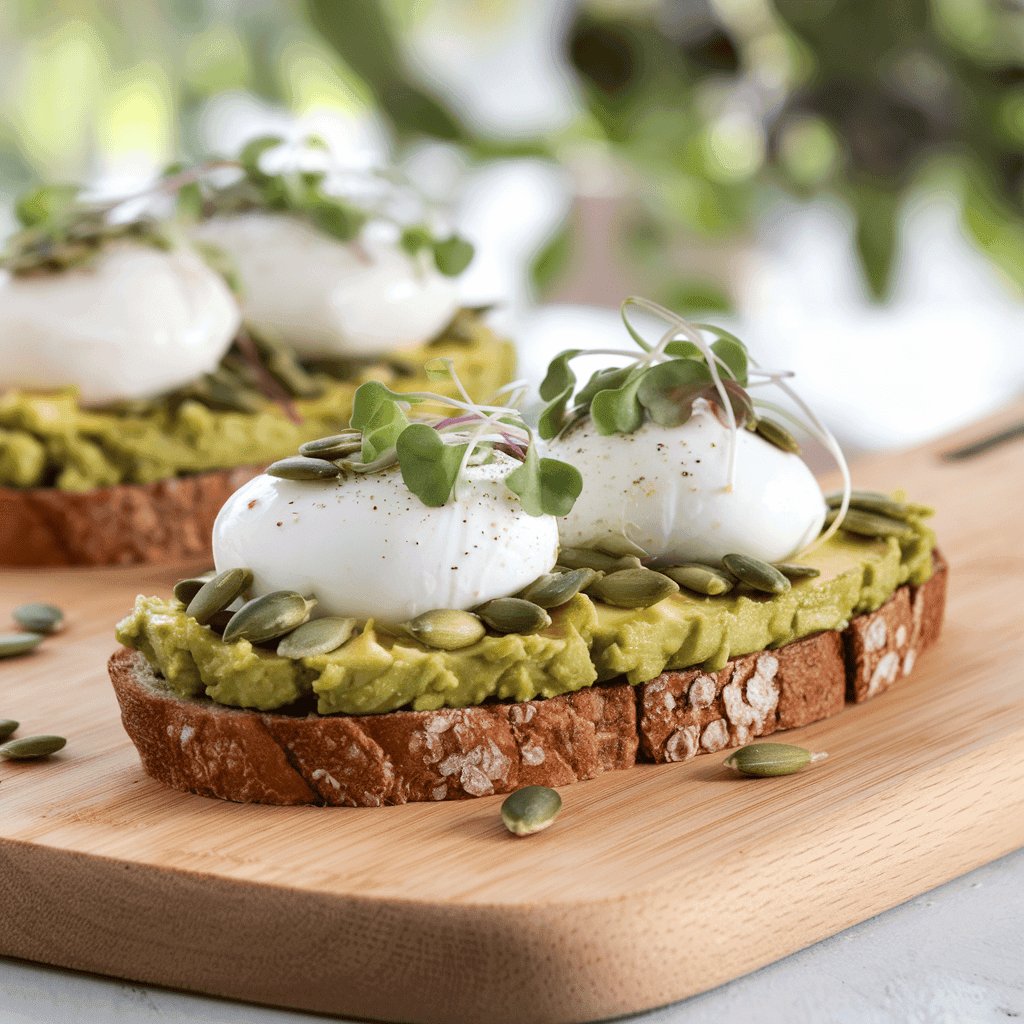
1. Supports Heart Health
Avocados are rich in monounsaturated fats, which are known to:
- Lower Bad Cholesterol (LDL): These fats help reduce harmful cholesterol levels, decreasing the risk of heart disease.
- Increase Good Cholesterol (HDL): Healthy fats promote a better cholesterol balance.
- Regulate Blood Pressure: The potassium in avocados helps control blood pressure by reducing the effects of sodium in the diet.
Studies have shown that diets rich in monounsaturated fats can lower heart disease risk by improving cardiovascular markers. Whole-grain bread, commonly used in avocado toast, also contributes to heart health due to its fiber content.
2. Aids Weight Management
Despite being calorie-dense, avocado toast can fit into a weight management plan due to its satisfying and nutrient-rich ingredients:
- Keeps You Full Longer: The combination of healthy fats and fiber promotes feelings of fullness, reducing the urge to snack between meals.
- Regulates Appetite: Studies suggest that eating avocados may help reduce overall calorie consumption by increasing satiety.
For those watching their weight, portion control and smart topping choices, such as adding eggs or smoked salmon, can maximize avocado toast’s weight-loss potential. Additionally, opting for whole-grain bread instead of refined varieties boosts fiber intake, which in turn helps with satiety. Furthermore, incorporating nutrient-dense vegetables like spinach or tomatoes not only enhances flavor but also adds essential vitamins and minerals without extra calories.
3. Promotes Digestive Health
Fiber is essential for digestive health, and avocado toast delivers plenty of it:
- Improves Gut Health: The fiber from both avocados and whole-grain bread supports a healthy gut by promoting the growth of beneficial gut bacteria.
- Prevents Constipation: Regular fiber intake can improve bowel movements and reduce the risk of digestive disorders.
Eating fiber-rich meals like avocado toast can lead to better digestion and overall gastrointestinal health.
4. Boosts Brain Function
The combination of healthy fats, vitamins, and minerals found in avocado toast contributes to cognitive health. For example, monounsaturated fats support brain function by promoting better blood flow and reducing inflammation. In addition, essential nutrients like folate and B vitamins aid in neurotransmitter production, while antioxidants such as vitamin E protect brain cells from oxidative stress. As a result, regularly consuming avocado toast may help maintain memory and cognitive performance over time.
- Omega-3 and Monounsaturated Fats: These fats are essential for brain function and memory.
- Folate and B Vitamins: Help maintain proper brain function and reduce the risk of cognitive decline.
- Antioxidants (Vitamin E): Protect brain cells from oxidative stress and inflammation.
Adding brain-boosting toppings like walnuts, seeds, or even a sprinkle of turmeric can enhance these benefits further.
5. Enhances Skin and Hair Health
Avocados are a beauty superfood thanks to:
- Vitamin E: An antioxidant that helps keep skin hydrated and protected from sun damage.
- Vitamin C: Supports collagen production, reducing wrinkles and improving skin elasticity.
- Healthy Fats: Promote glowing skin and healthy, shiny hair by locking in moisture.
Regularly eating avocado toast can contribute to better skin and hair, making it a favorite among wellness enthusiasts.
6. Regulates Blood Sugar Levels
The fiber and healthy fats in avocado toast slow down digestion, helping regulate blood sugar levels:
- Reduces Blood Sugar Spikes: Unlike sugary breakfast options, avocado toast has a low glycemic impact.
- Improves Insulin Sensitivity: The combination of whole grains and healthy fats supports stable energy levels throughout the day.
This makes avocado toast an excellent breakfast choice for people managing diabetes or looking to maintain balanced energy.
7. Strengthens Bones and Muscles
Avocados provide essential nutrients that promote bone and muscle health:
- Calcium and Vitamin K: Help maintain strong bones and reduce the risk of fractures.
- Magnesium and Potassium: Support muscle contraction and recovery after exercise.
Adding protein-rich toppings like eggs, smoked salmon, or cottage cheese can make avocado toast even more supportive of bone and muscle strength.
8. Supports Eye Health
Avocados contain carotenoids like lutein and zeaxanthin, which are essential for eye health:
- Reduces Age-Related Eye Problems: These antioxidants may lower the risk of macular degeneration and cataracts.
- Protects Against Blue Light Damage: Carotenoids help filter harmful light from screens and sunlight.
Combining avocado toast with leafy greens like spinach or arugula boosts its eye-health benefits even more.
Summary of Health Benefits
Avocado toast isn’t just a trendy breakfast—it’s a nutrient-dense meal with significant health benefits. Not only does it support heart health and aid digestion, but it also promotes brain function and improves skin. Moreover, its combination of healthy fats, fiber, and essential vitamins makes it a versatile option for various dietary needs. Therefore, incorporating avocado toast into your meal plan can be a powerful way to maintain a balanced and nutritious diet.
How to Make Avocado Toast Healthier
Avocado toast can be a nutritional powerhouse when prepared thoughtfully. By choosing the right ingredients, balancing macros, and adding nutrient-dense toppings, you can elevate its health benefits. Here’s how to make avocado toast healthier without sacrificing taste.
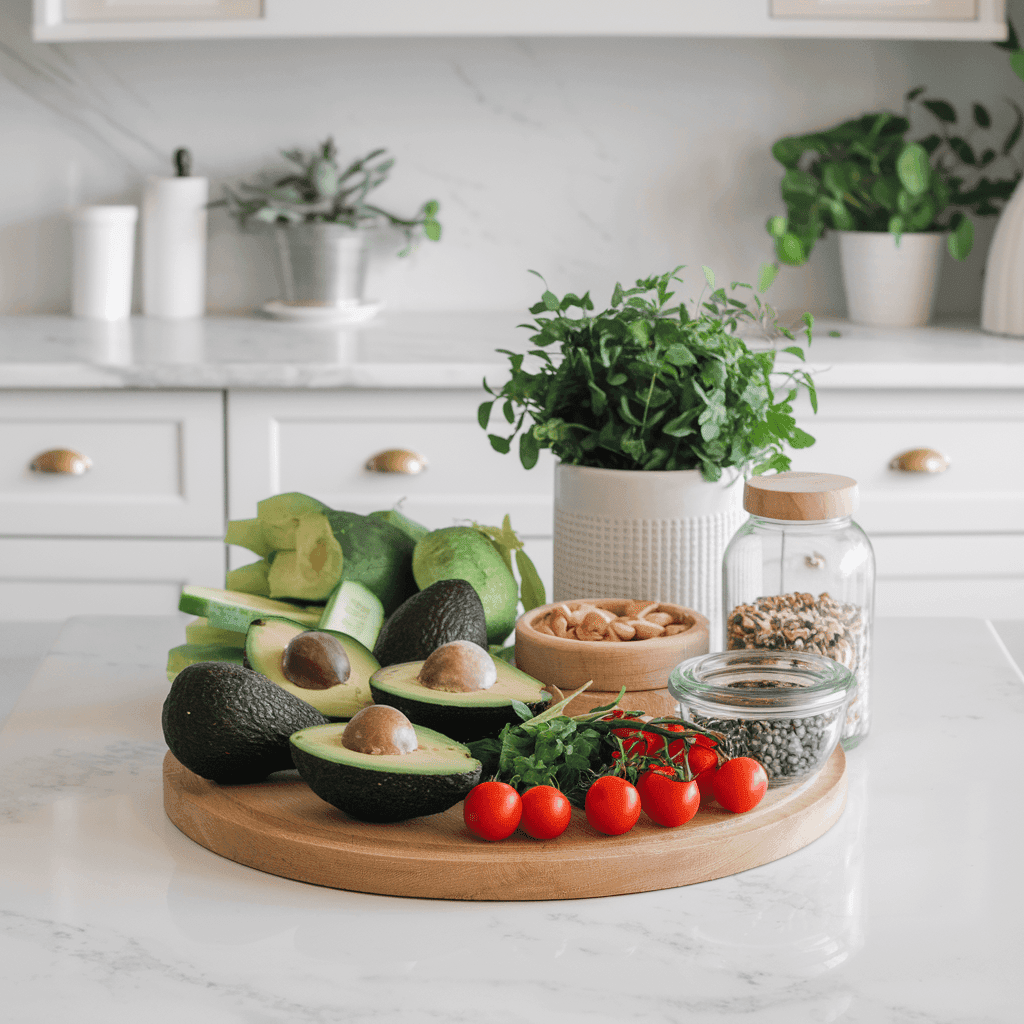
1. Choose the Right Bread
The bread you select forms the base of your avocado toast, affecting its fiber, protein, and glycemic index.
- Whole-Grain Bread: High in fiber, vitamins, and minerals.
- Sprouted Grain Bread: Packed with protein and easier to digest.
- Sourdough Bread: Lower glycemic index and good for gut health.
- Gluten-Free Options: Suitable for those with gluten intolerance or celiac disease.
Tip: Avoid white bread or heavily processed options, which offer little nutritional value.
2. Use Portion Control with Avocados
Avocados are healthy but calorie-dense, so portion control is essential.
- Suggested Serving: Use half an avocado per slice of toast (about 120-150 calories).
- Preparation Tip: Mash the avocado with lemon juice, salt, and pepper to enhance flavor without extra calories.
Tip: Spread evenly to enjoy every bite while keeping portions in check.
3. Add Protein-Rich Toppings
Boosting the protein content of avocado toast can make it more filling and balanced. Consider adding:
- Eggs: A poached or boiled egg adds about 6-8 grams of protein.
- Smoked Salmon: Provides heart-healthy omega-3 fatty acids.
- Cottage Cheese: Creamy and rich in protein.
- Turkey or Chicken Breast: A lean protein source for added fullness.
Tip: Choose lean and minimally processed proteins to keep sodium levels low.
4. Boost with Fiber and Nutrient-Rich Toppings
Enhance your avocado toast with fiber-filled and vitamin-packed ingredients:
- Leafy Greens: Arugula, spinach, or microgreens for extra vitamins.
- Vegetables: Cherry tomatoes, cucumbers, or radishes add crunch and antioxidants.
- Legumes: Add chickpeas or black beans for plant-based protein and fiber.
- Seeds and Nuts: Sprinkle chia seeds, hemp seeds, or crushed almonds for healthy fats and minerals.
Tip: Add a mix of textures for a more satisfying meal.
5. Add Healthy Flavor Enhancers
Instead of relying on salt, try these flavorful and health-boosting seasonings:
- Lemon Juice: Brightens the flavor and adds vitamin C.
- Chili Flakes: Adds heat and boosts metabolism.
- Garlic Powder: Enhances taste with minimal calories.
- Herbs: Fresh basil, cilantro, or parsley for freshness.
- Everything Bagel Seasoning: A savory topping with minimal sodium.
Tip: Mix and match herbs and spices to create unique flavor combinations.
6. Watch Out for Hidden Calories
Common toppings can add extra calories without offering much nutritional value. Avoid:
- Heavy Cheeses: Such as cream cheese or feta in large amounts.
- Sugary Sauces: Like balsamic glaze or sweet spreads.
- Processed Meats: Such as bacon or cured ham, which can be high in sodium and saturated fats.
Tip: Keep your toast balanced by sticking to natural, whole ingredients.
7. Pair with a Balanced Side
To turn avocado toast into a complete meal, pair it with a side:
- Side Salad: Fresh greens with a light vinaigrette.
- Fruit Bowl: Berries, apples, or citrus fruits for added vitamins and antioxidants.
- Smoothie: A protein-rich smoothie with spinach, berries, and almond milk.
- Soup: A light vegetable-based soup like tomato or carrot ginger.
8. Make It a Power Breakfast Bowl
For a more filling option, turn avocado toast into a breakfast bowl:
- Use a toasted whole-grain base.
- Add mashed avocado, a poached egg, cherry tomatoes, and leafy greens.
- Sprinkle with seeds and nuts for added crunch and nutrition.
Summary of Healthier Avocado Toast Tips
By making smarter ingredient choices, controlling portion sizes, and adding nutrient-dense toppings, you can transform your avocado toast into a balanced, satisfying meal. Whether you’re aiming for a protein-packed breakfast or a fiber-rich snack, customizing your avocado toast ensures it stays both delicious and healthy.
Is Avocado Toast Good for Weight Loss?
Avocado toast has gained popularity among health-conscious individuals, but is it truly effective for weight loss? Its nutrient-dense profile can support weight management when prepared correctly. Let’s explore how avocado toast fits into a calorie-conscious diet and how to maximize its weight-loss potential.
1. High in Healthy Fats for Satiety
Avocados are rich in monounsaturated fats, which are linked to weight management due to their satiating properties:
- Satiety Boost: Healthy fats slow down digestion, keeping you full for longer.
- Cravings Control: Eating avocado toast can reduce the likelihood of snacking on unhealthy foods.
Tip: Stick to half an avocado per serving to balance calorie intake while enjoying the benefits of healthy fats.
2. Packed with Fiber for Digestion
Avocado toast contains dietary fiber from both avocados and whole-grain bread, supporting weight loss through:
- Improved Digestion: Fiber promotes regular bowel movements, reducing bloating and improving gut health.
- Reduced Hunger: Fiber helps you stay full, decreasing the urge to overeat.
Tip: Choose whole-grain or sprouted bread to maximize fiber content.
3. Supports Blood Sugar Regulation
Avocado toast has a low glycemic index when made with whole-grain bread, helping:
- Prevent Blood Sugar Spikes: Steady energy levels reduce sugar cravings and overeating.
- Control Insulin Levels: Better insulin sensitivity supports weight loss and metabolic health.
Tip: Avoid refined bread and sugary toppings that can spike blood sugar.
4. Customizable for Calorie Control
The calorie count of avocado toast depends on portion size and toppings:
- Lower-Calorie Options: Fresh vegetables like tomatoes, cucumbers, and arugula add volume without extra calories.
- Calorie-Heavy Additions: Be mindful of ingredients like cheese, bacon, and mayonnaise-based spreads.
Tip: Use portion control when adding higher-calorie toppings such as eggs, nuts, or smoked salmon.
5. Protein-Boosting Toppings for Fat Loss
Protein is essential for weight loss because it promotes muscle preservation and fat burning:
- Add a Protein Source: Eggs, cottage cheese, or turkey slices increase protein content.
- Plant-Based Options: Use chickpeas, tofu, or seeds for a vegetarian protein boost.
Tip: A balanced avocado toast with protein and fiber keeps you full and energized for hours.
6. Supports Active Lifestyles and Exercise Recovery
For people with active lifestyles, avocado toast provides:
- Post-Workout Recovery: Healthy fats and potassium help reduce muscle cramps and aid recovery.
- Energy for Exercise: The carbs from whole-grain bread provide fuel for workouts.
Tip: Pair avocado toast with a post-workout smoothie or a side of fresh fruit for extra nutrients.
7. Portion Size and Meal Frequency
While avocado toast can be part of a weight-loss diet, eating it in moderation is key:
- One Slice Per Meal: Stick to one slice topped with half an avocado to control calories.
- Frequency: Enjoy avocado toast a few times a week, balancing it with other low-calorie, high-protein meals.
Tip: If weight loss is your goal, track your daily calorie intake to ensure avocado toast fits into your plan.
8. Smart Meal Pairings
Pairing avocado toast with nutrient-dense sides can make it more weight-loss-friendly:
- Vegetable Side Salad: Adds vitamins and fiber without extra calories.
- Fresh Fruit Bowl: Provides natural sweetness and hydration.
- Green Smoothie: Enhances nutrition while keeping calories in check.
Tip: Avoid calorie-heavy beverages like sugary coffee drinks or juices when having avocado toast.
Summary of Weight-Loss Benefits
Avocado toast can be an excellent choice for weight loss when made with nutritious ingredients and eaten in moderation. Its combination of healthy fats, fiber, and protein supports satiety, digestion, and sustained energy. To maximize its weight-loss potential, use whole-grain bread, control portion sizes, and avoid high-calorie toppings.
How Often Should You Eat Avocado Toast?
Avocado toast can be a healthy addition to your diet, but how often should you eat it? The answer depends on your nutritional goals, portion sizes, and how well you balance it with other meals. Let’s explore the factors that determine how frequently avocado toast should appear on your menu.
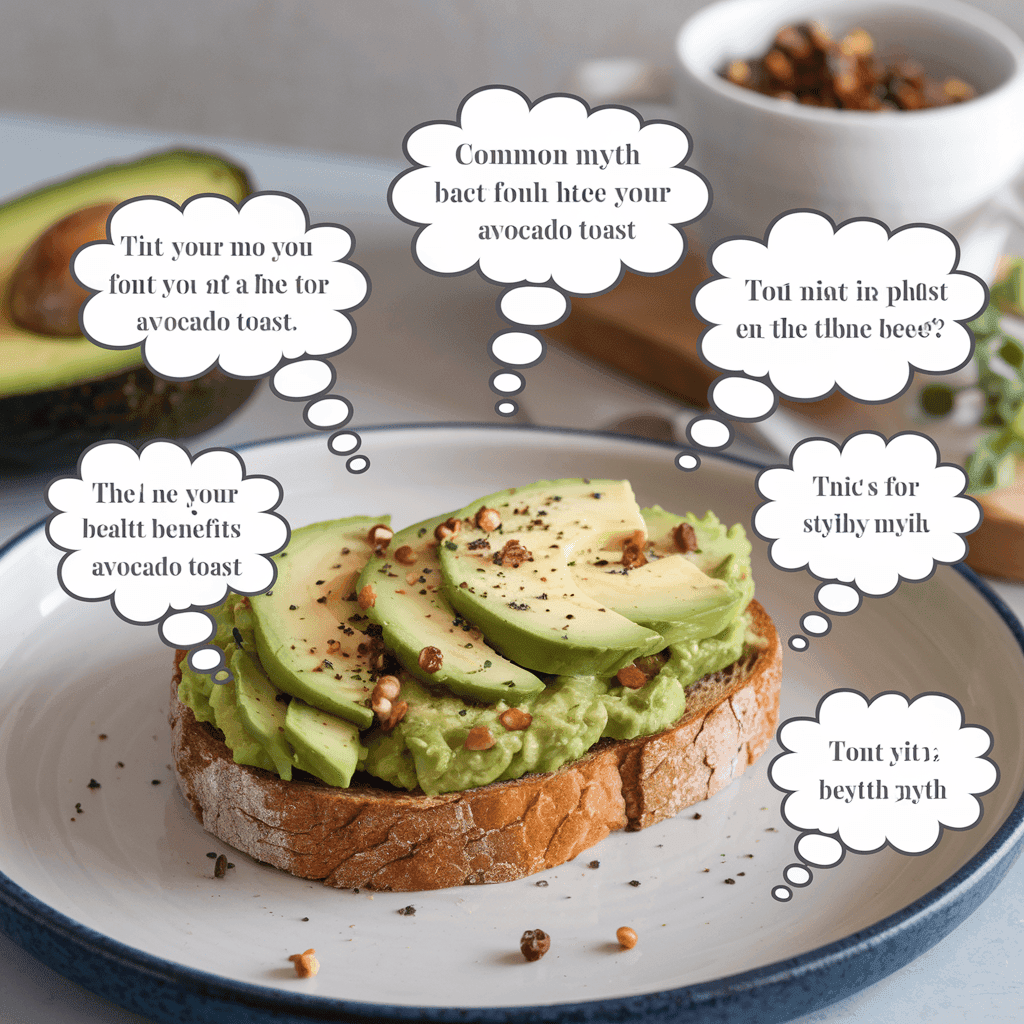
1. Daily Consumption: Is It Safe?
Is Eating Avocado Toast Every Day Healthy?
- Yes, If Balanced: Eating avocado toast daily can be beneficial if portion sizes are managed and the toppings are nutritious.
- Nutrient Balance: Avocados provide healthy fats, fiber, and essential vitamins, while whole-grain bread contributes complex carbs and fiber.
Health Tip: Balance daily avocado toast with other nutrient-rich meals like lean proteins, vegetables, and fruits.
2. Recommended Serving Sizes
How Much Avocado Is Too Much?
- Standard Portion: Half an avocado per serving (about 120-150 calories) is ideal for most people.
- Bread Choice: Stick to one slice of whole-grain bread (70-120 calories).
Why Portion Control Matters:
- Avocados are calorie-dense due to their high fat content.
- Overeating can lead to excess calorie consumption and potential weight gain.
Tip: Measure portions using a food scale if following a strict calorie-controlled diet.
3. Factors Affecting Frequency
The right frequency depends on:
- Health Goals:
- Weight Loss: Enjoy avocado toast 2-3 times per week with low-calorie toppings.
- Muscle Building: Eat it more often with protein-rich additions like eggs, chicken, or salmon.
- Dietary Restrictions:
- Consider personal dietary needs like low-carb, keto, or gluten-free plans.
- Overall Diet Variety:
- Rotate avocado toast with other healthy meals like oatmeal, salads, or smoothies to ensure a balanced intake of nutrients.
4. When to Eat Avocado Toast
Best Times for Avocado Toast:
- Breakfast: Provides lasting energy and keeps you full until lunch.
- Post-Workout Meal: Replenishes healthy fats, potassium, and carbs for recovery.
- Light Lunch or Dinner: Pair with a side salad or lean protein for a well-rounded meal.
Tip: Avoid eating avocado toast late at night to prevent consuming excess calories before bedtime.
5. Balancing Nutritional Intake
Why Variety Is Important:
- Relying solely on avocado toast can lead to nutrient imbalances.
- Include protein-rich foods, vegetables, and fruits in other meals.
- Diversify your diet with different whole grains, plant-based proteins, and healthy fats.
6. Potential Risks of Overeating Avocado Toast
Eating avocado toast too often or in large portions can cause:
- Weight Gain: Due to its high calorie and fat content.
- Nutrient Imbalance: Lack of dietary variety can lead to vitamin and mineral deficiencies.
- Digestive Issues: Overeating avocados may cause stomach discomfort in sensitive individuals.
7. Special Considerations
When to Limit Consumption:
- Medical Conditions: People with heart conditions or high cholesterol should consult a healthcare provider about avocado consumption.
- Environmental Impact: Due to the environmental cost of avocado farming, consider enjoying it in moderation to support sustainability efforts.
Summary of How Often to Eat Avocado Toast
Avocado toast can be enjoyed daily if portion sizes are controlled, and meals are balanced with other nutrient-rich foods. For weight management or specific dietary goals, consider having it 2-4 times per week. Customizing toppings and bread types can keep avocado toast both healthy and delicious while ensuring you meet your overall nutritional needs.
Best Ingredients for Healthy Avocado Toast
Creating a nutritious avocado toast depends on selecting the right ingredients. From the bread base to the toppings, every element plays a crucial role in enhancing its nutritional value and taste. In particular, choosing whole-grain bread provides essential fiber, while fresh, ripe avocados offer healthy fats and vitamins. Additionally, protein-rich toppings like eggs or smoked salmon can boost its filling power, and vegetables like tomatoes and spinach add essential nutrients. With these considerations in mind, here’s a guide to the best ingredients for making healthy and delicious avocado toast.
1. Choosing the Best Bread
The type of bread forms the foundation of your avocado toast. Opt for nutrient-dense options for maximum health benefits:
- Whole-Grain Bread: High in fiber, vitamins, and minerals.
- Sprouted Grain Bread: Easier to digest and more nutrient-rich.
- Sourdough Bread: Lower glycemic index and supports gut health.
- Gluten-Free Bread: Ideal for those with gluten intolerance or celiac disease.
Tip: Avoid white bread and heavily processed varieties to reduce empty calories.
2. Picking the Perfect Avocado
The avocado is the star of the dish, so choose the freshest and ripest option:
- How to Select: Look for avocados that yield slightly to gentle pressure without being too soft or mushy.
- Preparation Tip: Mash the avocado with lemon juice, salt, and pepper to preserve freshness and add flavor.
Tip: Store leftover avocado in an airtight container with a squeeze of lemon to prevent browning.
3. Adding Protein-Packed Toppings
Protein makes avocado toast more filling and nutritionally balanced:
- Eggs: A poached or boiled egg adds 6-8 grams of protein.
- Smoked Salmon: Provides omega-3 fatty acids and lean protein.
- Chicken or Turkey Breast: Lean protein for post-workout recovery.
- Plant-Based Options: Use chickpeas, black beans, or tofu for vegan protein sources.
Tip: Use fresh, minimally processed protein sources for the healthiest results.
4. Enhancing with Vegetables and Greens
Adding vegetables boosts the nutritional profile with fiber, vitamins, and minerals:
- Leafy Greens: Arugula, spinach, or microgreens for extra vitamins.
- Tomatoes: Cherry tomatoes add sweetness and vitamin C.
- Cucumbers: Provide hydration and a satisfying crunch.
- Radishes: Add a peppery kick and boost digestion.
Tip: Layer fresh vegetables on top of the avocado spread for added texture and nutrition.
5. Boosting Flavor with Herbs and Spices
Skip high-sodium seasonings and opt for natural flavor enhancers:
- Fresh Herbs: Basil, cilantro, parsley, or chives for a burst of freshness.
- Spices: Chili flakes, paprika, garlic powder, or cumin for depth of flavor.
- Citrus: Lemon or lime juice for brightness and vitamin C.
- Salt Alternatives: Use sea salt sparingly or substitute with potassium-rich salt alternatives.
Tip: Customize flavors based on your preferences while keeping salt levels in check.
6. Adding Healthy Fats and Crunch
Healthy fats improve satiety and provide essential nutrients:
- Seeds: Chia seeds, hemp seeds, or flaxseeds for omega-3s and fiber.
- Nuts: Crushed almonds, walnuts, or pumpkin seeds for added crunch and protein.
- Olive Oil: A light drizzle of extra virgin olive oil for heart-healthy fats.
Tip: Use seeds and nuts in moderation to avoid excess calorie intake.
7. Exploring Creative Topping Ideas
Take your avocado toast to the next level with these creative toppings:
- Mediterranean Style: Add feta cheese, olives, and cherry tomatoes.
- Mexican-Inspired: Top with black beans, corn, and a sprinkle of cotija cheese.
- Caprese Twist: Use tomatoes, mozzarella, basil, and balsamic glaze.
- Sweet & Savory: Add strawberries, a drizzle of honey, and crushed pistachios.
Tip: Try seasonal toppings for variety and maximum freshness.
Summary of the Best Ingredients for Avocado Toast
A perfectly crafted avocado toast starts with whole-grain bread and fresh, ripe avocados. To take it a step further, enhance its health benefits by adding protein-rich toppings like eggs or smoked salmon, as well as fiber-packed vegetables such as spinach or tomatoes. Additionally, nutrient-dense seeds or nuts like chia, flax, or pumpkin seeds can boost its nutritional value. With so many customization possibilities, you can create a balanced, flavorful meal that perfectly suits your taste and dietary goals.
FAQs About Avocado Toast
Here are some frequently asked questions about avocado toast, including its health benefits, preparation tips, and dietary considerations. Whether you’re curious about its nutritional value, best ingredient choices, or how to make it more filling, these FAQs provide helpful insights. By understanding how to customize avocado toast to fit your lifestyle, you can enjoy this popular meal while still meeting your dietary goals.
1. Is Avocado Toast Good for You?
Answer:
Yes, avocado toast can be very healthy when made with nutrient-dense ingredients. It provides heart-healthy fats, fiber, and essential vitamins like potassium and vitamin E. Use whole-grain bread and balance it with protein-rich toppings like eggs or seeds for maximum nutritional value.
2. Can I Eat Avocado Toast Every Day?
Answer:
Eating avocado toast daily is safe as long as portion sizes are managed and other meals remain balanced. For example, using one slice of whole-grain bread and half an avocado helps control calorie intake while still providing essential nutrients. Additionally, varying the toppings with protein-rich options like eggs or plant-based choices such as chickpeas can prevent nutritional imbalances and ensure a well-rounded diet.
3. Is Avocado Toast Good for Weight Loss?
Answer:
Yes, avocado toast can support weight loss when portioned correctly. Its fiber and healthy fats help you feel full longer, reducing the likelihood of snacking. Pair it with protein-rich toppings like eggs or lean meats to increase its weight-loss potential.
4. What Bread Is Best for Avocado Toast?
Answer:
The best bread for avocado toast is whole-grain, sprouted, or sourdough bread. These options are rich in fiber and have a lower glycemic index, supporting digestive health and stabilizing blood sugar levels. Avoid white bread due to its refined carbs and lack of nutrients.
5. How Many Calories Are in Avocado Toast?
Answer:
The calorie content depends on the ingredients used:
- Whole-grain bread (1 slice): 70-120 calories
- Half an avocado: 120-150 calories
- Toppings (egg, seeds, or veggies): 50-200 calories
On average, a basic avocado toast contains 200-300 calories. Add protein-rich toppings for a more filling meal while keeping portion sizes in mind.
6. Is Avocado Toast Gluten-Free?
Answer:
Avocado toast can be made gluten-free by using gluten-free bread, sweet potato slices, or rice cakes. In particular, it’s important to check bread labels for gluten-free certification if you have celiac disease or gluten sensitivity. Additionally, pairing your avocado toast with a side salad, fruit bowl, or smoothie can help create a well-rounded, nutritious meal that fits various dietary needs.
Summary of FAQs About Avocado Toast
Avocado toast is a versatile, nutrient-packed meal that works well for various dietary preferences and lifestyles. By carefully selecting the right ingredients, managing portion sizes, and including balanced toppings, you can create a satisfying, healthy dish that easily fits into almost any diet. Whether you follow a plant-based, low-carb, or gluten-free lifestyle, avocado toast can be customized to meet your nutritional needs while still being delicious and enjoyable.
Conclusion: Is Avocado Toast Actually Healthy?
Avocado toast is more than just a food trend—it’s a versatile, nutrient-dense meal that can fit into almost any diet. Packed with heart-healthy fats, fiber, and essential vitamins, it supports digestion, weight management, and even brain function. However, its health benefits depend on making thoughtful ingredient choices, managing portion sizes, and balancing toppings for a complete, nutritious meal.

